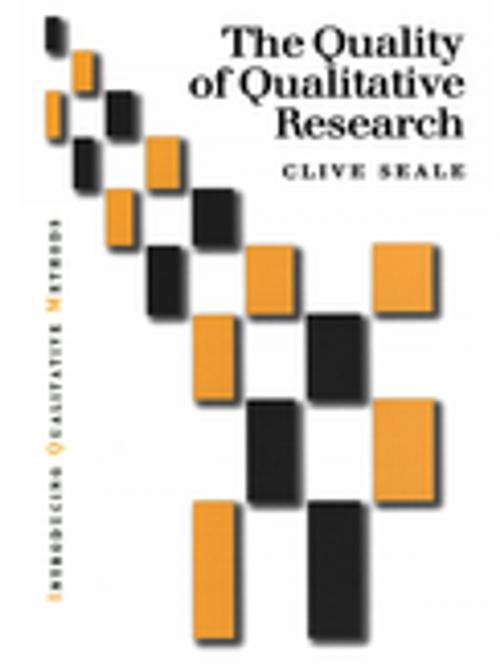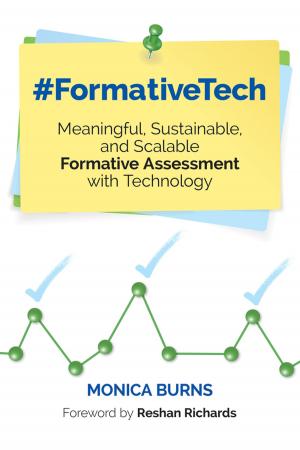The Quality of Qualitative Research
Nonfiction, Reference & Language, Reference, Research, Social & Cultural Studies, Social Science| Author: | Clive Seale | ISBN: | 9781446236215 |
| Publisher: | SAGE Publications | Publication: | July 26, 1999 |
| Imprint: | SAGE Publications Ltd | Language: | English |
| Author: | Clive Seale |
| ISBN: | 9781446236215 |
| Publisher: | SAGE Publications |
| Publication: | July 26, 1999 |
| Imprint: | SAGE Publications Ltd |
| Language: | English |
This textbook is designed to help students and practicing researchers to improve the quality of their research. Practical examples and exercises demonstrate how to evaluate qualitative research, how to plan and collect good quality data, how to do thoughtful analysis, and how to write and report on qualitative research.
"Apart from its inherent readability, I found three other attractive features about the book: First is the use of exemplars based on case studies from qualitative studies, including Whyte's Street Corner Society; second, is the quotes from key methodological texts reflecting on a range of qualitative research traditions; and third, is the use of philosophical argument and reference in the book which provided an added depth to the debate, often lacking in more practically oriented books. These deliberations take readers to a higher plane, whilst still allowing the novice to philosophy to gain an insight into theory." —Forum for Qualitative Research
"Seale steers a dispassionate course - both pragmatic and thoughtful - through the sometimes stormy waters of qualitative analysis. Anyone wanting an up-to-date picture of qualitative analysis will benefit from this book. It is truly a quality contribution to the field." —Nigel Fielding, University of Surrey
"Clearly and engagingly written, this book covers crucially important issues such as the generalisability of findings, the grounding of theory and the validity and reliability of research reports. With frequent summaries of key points, criteria for evaluating research reports and discussions exercises, this is an extremely useful text for students and professionals alike." —Derek Layder, University of Leicester
"This is a brilliant, carefully crafted, even-handed, comprehensive analysis of the multiple ways in which quality is assessed in contemporary qualitative inquiry. Clive Seale provides a balanced, subtly nuanced treatment of this key problem." —Norman Denzin, University of Illinois, Urbana-Chanpaign
"The coverage is impressive and the depth of scholarship impeccable. Both students and seasoned investigators will find the author's pragmatic approach refreshing and helpful. It will appeal to the naturalistic researcher as well as to empirically-oriented scholars smitten by postmodern questions. I would definitely recommend it to my students. A splendid leading text for classroom adoption." —Jaber F Gubrium, University of Florida
"Clive Seale has performed an important service for social science researchers by finding a sane middle ground between the twin fanaticisms of radical interpretivism and quantiative scientism. His book is practical, telling people who want to get research done how to do that in an effective and reasonable way. His explanations are clear and concise, his examples well chosen, and the practices he recommends are doable. You can learn a lot about how to approach research from this book." — Howard S Becker, University of California, Santa Barbara
"For the undergraduate, or postgraduate looking for a comfortable drive through an increasingly unmanageable literature, this book provides an outstanding introduction." —Qualitative Research
This textbook is designed to help students and practicing researchers to improve the quality of their research. Practical examples and exercises demonstrate how to evaluate qualitative research, how to plan and collect good quality data, how to do thoughtful analysis, and how to write and report on qualitative research.
"Apart from its inherent readability, I found three other attractive features about the book: First is the use of exemplars based on case studies from qualitative studies, including Whyte's Street Corner Society; second, is the quotes from key methodological texts reflecting on a range of qualitative research traditions; and third, is the use of philosophical argument and reference in the book which provided an added depth to the debate, often lacking in more practically oriented books. These deliberations take readers to a higher plane, whilst still allowing the novice to philosophy to gain an insight into theory." —Forum for Qualitative Research
"Seale steers a dispassionate course - both pragmatic and thoughtful - through the sometimes stormy waters of qualitative analysis. Anyone wanting an up-to-date picture of qualitative analysis will benefit from this book. It is truly a quality contribution to the field." —Nigel Fielding, University of Surrey
"Clearly and engagingly written, this book covers crucially important issues such as the generalisability of findings, the grounding of theory and the validity and reliability of research reports. With frequent summaries of key points, criteria for evaluating research reports and discussions exercises, this is an extremely useful text for students and professionals alike." —Derek Layder, University of Leicester
"This is a brilliant, carefully crafted, even-handed, comprehensive analysis of the multiple ways in which quality is assessed in contemporary qualitative inquiry. Clive Seale provides a balanced, subtly nuanced treatment of this key problem." —Norman Denzin, University of Illinois, Urbana-Chanpaign
"The coverage is impressive and the depth of scholarship impeccable. Both students and seasoned investigators will find the author's pragmatic approach refreshing and helpful. It will appeal to the naturalistic researcher as well as to empirically-oriented scholars smitten by postmodern questions. I would definitely recommend it to my students. A splendid leading text for classroom adoption." —Jaber F Gubrium, University of Florida
"Clive Seale has performed an important service for social science researchers by finding a sane middle ground between the twin fanaticisms of radical interpretivism and quantiative scientism. His book is practical, telling people who want to get research done how to do that in an effective and reasonable way. His explanations are clear and concise, his examples well chosen, and the practices he recommends are doable. You can learn a lot about how to approach research from this book." — Howard S Becker, University of California, Santa Barbara
"For the undergraduate, or postgraduate looking for a comfortable drive through an increasingly unmanageable literature, this book provides an outstanding introduction." —Qualitative Research















